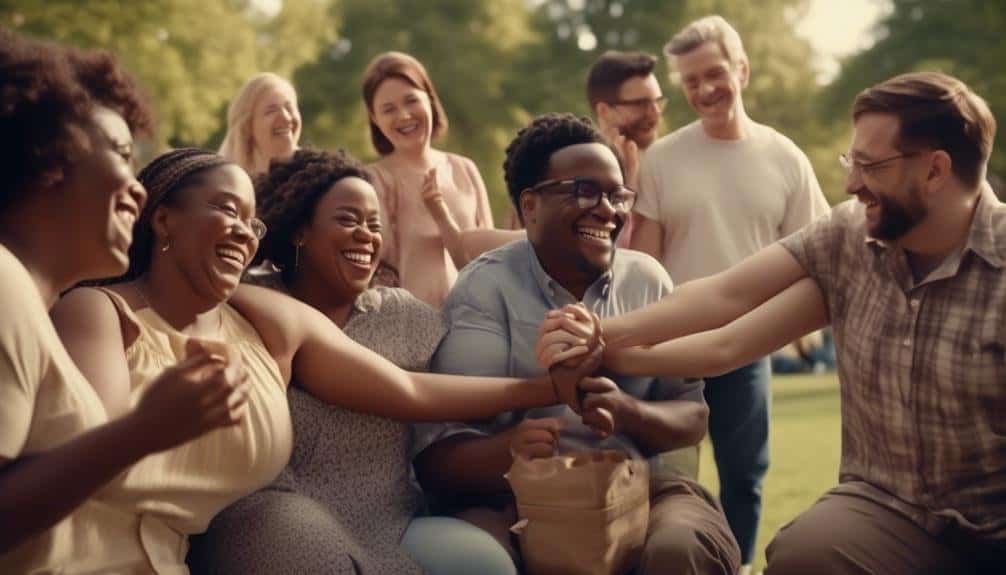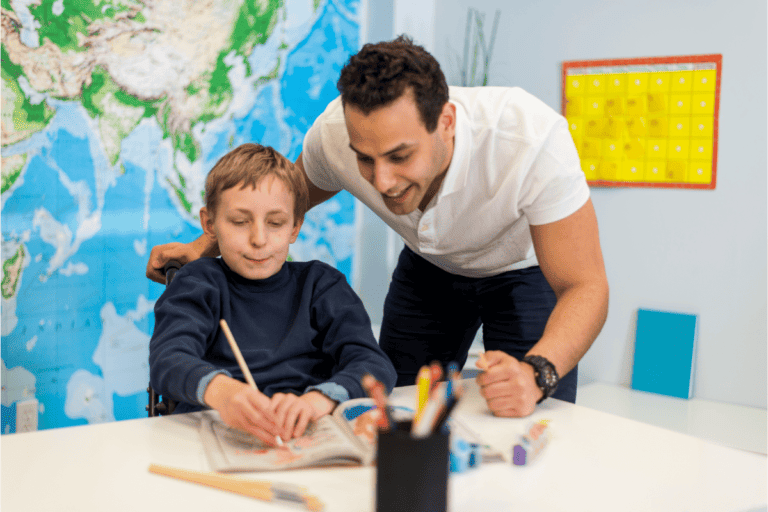Dating and Relationships for Individuals With Disabilities
Navigating the world of dating and relationships can be a complex and often daunting experience for individuals with disabilities. It involves confronting not only the usual challenges of forming and maintaining romantic connections, but also the additional barriers imposed by societal stigmas, accessibility issues, and personal insecurities.
However, it is essential to recognize that love and companionship are universal desires, and individuals with disabilities deserve fulfilling relationships as much as anyone else. In this discussion, we will explore the unique dynamics, obstacles, and joys that come with dating and forming relationships for individuals with disabilities, and how they can navigate these complexities to find love and companionship.
Key Takeaways
- Misconceptions and stereotypes about disability can lead to discrimination and exclusion in dating.
- Limited access to social events and public spaces can create barriers to meeting potential partners.
- Lack of representation in media can impact self-esteem and confidence in individuals with disabilities.
- Accessibility barriers in physical environments and digital platforms can make it difficult for individuals with disabilities to navigate the dating and relationship landscape.
Understanding Disability and Dating
Understanding the complexities of dating with a disability requires a nuanced and compassionate perspective that acknowledges the unique challenges and experiences faced by individuals within the disability community.
Society's perceptions of disability often create significant barriers to dating. Misconceptions and stereotypes about disability can lead to discrimination and exclusion, making it challenging for individuals with disabilities to find meaningful relationships.
Dating challenges for people with disabilities can include limited access to social events and public spaces, as well as a lack of representation in media and popular culture, which can impact self-esteem and confidence in dating. Additionally, accessibility barriers in physical environments and digital platforms can further hinder the dating experience for individuals with disabilities.
It is crucial to recognize these obstacles and work towards creating a more inclusive and understanding dating environment for people with disabilities. By addressing societal attitudes, promoting accessibility, and fostering empathy, we can strive to make dating a more positive and fulfilling experience for all individuals, regardless of their abilities.
Overcoming Social Stigmas
Overcoming social stigmas associated with disability in the context of dating requires a concerted effort to challenge misconceptions and foster a more inclusive and understanding societal mindset. Challenging stereotypes and cultivating acceptance and understanding are crucial steps towards creating a dating environment that is free from discrimination and prejudice. By addressing these social stigmas, individuals with disabilities can experience more fulfilling and meaningful relationships.
| Challenging Stereotypes | Cultivating Acceptance and Understanding |
|---|---|
| Advocating for accurate representation of individuals with disabilities in media | Promoting empathy and understanding through educational initiatives |
| Encouraging open discussions about disability and relationships | Creating safe spaces for individuals to share their experiences and challenges |
| Empowering individuals with disabilities to advocate for themselves | Providing support and resources for both individuals with disabilities and their potential partners |
| Promoting inclusive language and behavior in social settings | Fostering a culture of respect and inclusivity within the dating community |
Navigating Accessibility Challenges
Navigating accessibility challenges can present unique obstacles for individuals with disabilities when it comes to dating and relationships. Physical barriers, such as inaccessible venues or transportation, can limit opportunities to meet potential partners.
Effective communication and understanding are crucial, and having a supportive community can make a significant difference in overcoming these challenges.
Physical Accessibility Barriers
Individuals with disabilities often face significant challenges when it comes to accessing physical spaces and navigating through environments that lack adequate accessibility features. This can create barriers to participation in social activities, including dating and building relationships. Barrier-free spaces and inclusive design are essential for creating environments that are accessible to everyone. Here is a table summarizing common physical accessibility barriers and potential solutions:
| Accessibility Barrier | Potential Solution |
|---|---|
| Lack of ramps and elevators | Install ramps and elevators |
| Narrow doorways and hallways | Widening doorways and hallways |
| Inaccessible restrooms | Retrofitting restrooms with grab bars and accessible fixtures |
It is crucial for society to prioritize the creation of inclusive environments to ensure that individuals with disabilities can fully participate in dating and relationship-building activities.
Communication and Understanding
When addressing accessibility challenges in dating and relationships for individuals with disabilities, effective communication and mutual understanding are fundamental to fostering an inclusive and supportive environment. Navigating relationship dynamics can be complex, but with the right communication strategies, individuals with disabilities can build strong and fulfilling connections.
Here are some key considerations for enhancing communication and understanding:
- Active Listening: Practice active listening to truly understand your partner's perspective and emotions.
- Clear Expression: Encourage open and clear expression of thoughts and feelings to foster a deeper emotional understanding.
- Empathy and Patience: Cultivate empathy and patience to navigate the unique challenges that may arise in the relationship.
- Adapted Communication: Explore and utilize adaptive communication methods that cater to individual needs and preferences.
Support From Community
Effective community support plays a crucial role in addressing accessibility challenges faced by individuals with disabilities in dating and relationships, fostering an environment of understanding and inclusion. Community support can come in various forms, including accessible venues, transportation, and inclusive social events. The table below illustrates some key elements of community support that can enhance social inclusion for individuals with disabilities in the context of dating and relationships.
| Community Support | Examples |
|---|---|
| Accessible Venues | Restaurants with ramps and wide doorways |
| Inclusive Social Events | Speed dating events for people with disabilities |
| Transportation Assistance | Accessible public transportation options |
| Support Groups | Social groups specifically for individuals with disabilities |
Building Confidence and Self-Worth
Building confidence and self-worth is an essential part of dating and relationships, especially for individuals with disabilities. Overcoming self-doubt and embracing personal strengths can significantly impact one's ability to form meaningful connections and cultivate healthy relationships.
Overcoming Self-Doubt
Developing a strong sense of self-worth and confidence is essential in navigating the complexities of dating and relationships for individuals with disabilities. Overcoming self-doubt is a journey that requires patience and self-compassion. Here are some key strategies to help in this process:
- Positive Affirmations: Practice daily affirmations to challenge negative self-talk and reinforce self-worth.
- Seek Support: Surround yourself with a supportive network of friends, family, or a therapist who can provide encouragement and understanding.
- Set Realistic Goals: Break down larger goals into smaller, achievable steps to build confidence through accomplishment.
- Self-Care Practices: Engage in activities that promote self-care and self-acceptance, such as mindfulness, meditation, or hobbies that bring joy.
Embracing Personal Strengths
Navigating the complexities of dating and relationships for individuals with disabilities requires a deep understanding and appreciation of personal strengths, which serves as a foundation for building confidence and self-worth.
Embracing independence is crucial in cultivating a strong sense of self-empowerment. Recognizing and celebrating one's unique abilities and talents can lead to increased self-acceptance.
Embracing personal strengths also involves acknowledging areas for personal growth, fostering a mindset of continuous self-improvement. Building confidence and self-worth is an ongoing process that involves acknowledging one's worth and capabilities.
By recognizing personal strengths and actively working towards personal growth, individuals with disabilities can enhance their self-esteem and feel more empowered in navigating the complexities of dating and relationships.
This self-awareness and appreciation of personal strengths are essential in fostering healthy and fulfilling connections with others.
Communication and Disclosure
Establishing open and honest communication is essential for individuals with disabilities to foster meaningful and fulfilling relationships. When it comes to disclosure etiquette and effective communication in dating and relationships, there are several key considerations to keep in mind:
- Timing: Deciding when to disclose a disability is a personal choice. It's important to gauge the level of trust and comfort in the relationship before sharing this information.
- Clarity: When disclosing a disability, being clear and open about how it may impact the relationship can help set realistic expectations and promote understanding.
- Active Listening: Effective communication involves active listening and empathy. Both partners should feel comfortable expressing their needs, concerns, and boundaries.
- Support: Building a support network of friends, family, or disability-specific communities can provide additional resources and understanding for both individuals in the relationship.
Navigating communication and disclosure in relationships can be complex, but by approaching these aspects with empathy and understanding, individuals with disabilities can cultivate healthy and fulfilling connections.
Exploring Supportive Communities
Exploring supportive communities can provide individuals with disabilities valuable connections, resources, and understanding to navigate the challenges and joys of dating and relationships. Whether it's through online resources, peer support, inclusive events, or social gatherings, finding a supportive community can make a significant difference in one's dating journey. Below is a table outlining different types of supportive communities and the benefits they offer:
| Supportive Communities | Benefits |
|---|---|
| Online resources | Access to information and advice |
| Peer support | Shared experiences and emotional validation |
| Inclusive events | Opportunities to meet like-minded individuals |
| Social gatherings | Building friendships and expanding social circles |
Online resources can offer a wealth of knowledge and guidance, while peer support provides a sense of belonging and understanding. Inclusive events and social gatherings create opportunities for individuals to connect in person, fostering friendships and potential romantic relationships. These communities play a vital role in creating a supportive environment where individuals can share experiences, seek advice, and build meaningful connections.
Embracing Intimacy and Boundaries
Transitioning from the exploration of supportive communities, individuals with disabilities often encounter the need to navigate the complexities of embracing intimacy and setting boundaries within dating and relationships. This journey involves embracing vulnerability, fostering trust, and establishing healthy boundaries to build meaningful connections. Here are essential aspects to consider:
- Communication: Open and honest communication is crucial in establishing and respecting boundaries. It allows both partners to express their needs, desires, and concerns, fostering a deeper understanding and connection.
- Respect for Autonomy: Recognizing and respecting each other's autonomy is fundamental in building intimacy. It involves acknowledging and honoring individual choices and preferences, ensuring that both partners feel empowered and valued.
- Consent and Agency: Respecting each other's consent and agency is paramount. It involves understanding and honoring personal boundaries, ensuring that all interactions are consensual and mutually desired.
- Self-Care and Advocacy: Embracing intimacy also involves self-care and self-advocacy. It's essential for individuals with disabilities to prioritize their well-being, set boundaries, and communicate their needs effectively within the relationship.
Navigating intimacy and boundaries in relationships requires empathy, understanding, and a commitment to mutual growth and support. It's a continual process that evolves through open communication, respect, and a shared dedication to building a healthy and fulfilling connection.
Love and Acceptance
Embracing love and acceptance is an integral aspect of fostering meaningful and inclusive relationships for individuals with disabilities. Acceptance and inclusion are fundamental in building a supportive and nurturing environment for people with disabilities to thrive in their relationships.
It is essential for partners to show love and support, not just for the person, but for their unique experiences and challenges. Individuals with disabilities often face societal stigma and discrimination, making it crucial for their partners to provide unwavering acceptance and support.
This can be achieved by actively listening to their needs, understanding their perspective, and being patient and empathetic. Inclusive love and acceptance also involve creating an environment where the individual feels comfortable expressing themselves without fear of judgment.
It's important for both partners to openly communicate their needs and desires, promoting a strong sense of mutual understanding and respect. By nurturing an environment of love and acceptance, individuals with disabilities can experience fulfilling and enriching relationships that contribute to their overall well-being and happiness.
Planning for the Future
Considering the unique needs and aspirations of individuals with disabilities, thoughtful planning for the future is essential in cultivating fulfilling and sustainable relationships. Future planning involves considering various aspects such as financial security, healthcare, and overall well-being. When it comes to relationship goals, individuals with disabilities often face additional challenges that need to be addressed for a successful and fulfilling future.
Here are some important considerations for planning for the future in relationships:
- Financial Planning: It's crucial to plan for financial stability, including budgeting for healthcare expenses, accessibility modifications, and long-term care if needed.
- Legal Considerations: Establishing legal protections such as power of attorney, wills, and guardianship arrangements can provide peace of mind and security for both partners.
- Healthcare Access: Ensuring access to quality healthcare services and understanding insurance coverage options is essential for maintaining well-being and managing any disability-related needs.
- Social Support: Building a strong support network of friends, family, and community resources can provide emotional and practical assistance in navigating the challenges of living with a disability and maintaining a healthy relationship.
Conclusion
In conclusion, navigating dating and relationships with a disability can be like learning to dance in a crowded room, but with perseverance and support, it is possible to find love and acceptance.
Understanding disability, overcoming social stigmas, and navigating accessibility challenges are important aspects of building confidence and self-worth.
Communication and disclosure, exploring supportive communities, and embracing intimacy and boundaries are essential for creating meaningful connections.
Planning for the future involves recognizing the potential for love and happiness in all aspects of life.








